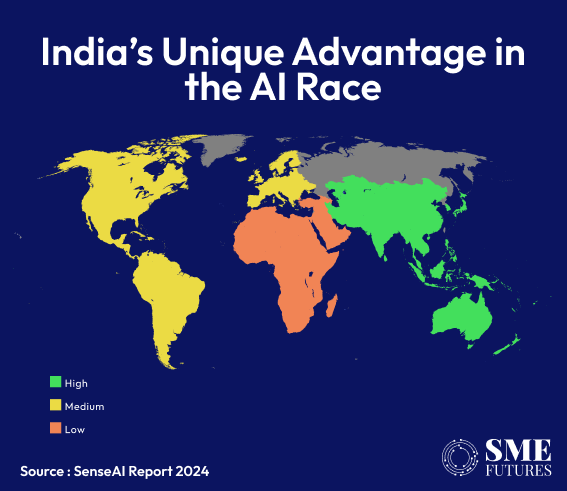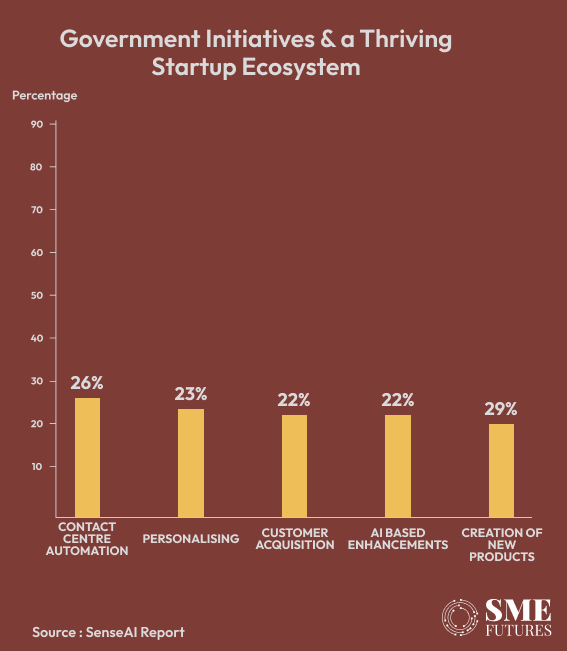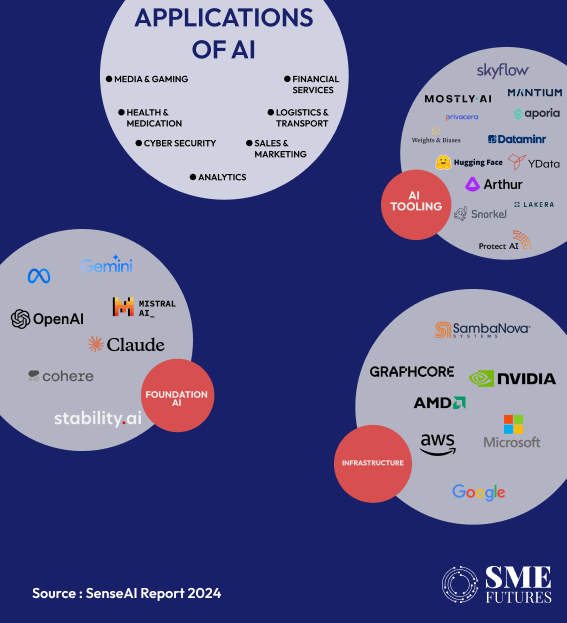In the ever-evolving landscape of artificial intelligence (AI), India is emerging as a formidable contender. With its unique blend of technological prowess, a vast and diverse data pool, and a burgeoning start-up ecosystem, India is not merely participating in the AI revolution, it is actively shaping its trajectory.
India’s unique advantages in the AI race

India’s strengths in the AI arena are multifaceted. The nation boasts a massive population of over 1.4 billion, generating an unparalleled volume and diversity of data. This data, often referred to as the “new oil” of the digital age, is the lifeblood of AI algorithms, enabling them to learn, adapt, and make increasingly accurate predictions. The sheer scale and heterogeneity of India’s data provides a rich training ground for AI models, allowing them to develop a nuanced understanding of human behaviour, preferences, and needs.
Moreover, India has long been recognised as a global hub for technology and engineering talent. Its vast pool of skilled engineers, data scientists, and researchers provides a fertile ground for AI innovation. This talent pool is not only driving cutting-edge research but is also fuelling the growth of a vibrant start-up ecosystem that is becoming a hotbed for AI-driven solutions. Indian AI researchers and engineers are making significant contributions to the field, publishing groundbreaking papers, developing innovative algorithms, and pushing the boundaries of possibilities with AI.
“Access to highly skilled talent, including AI scientists, data engineers, and cloud specialists, enables us to constantly drive innovation through our state-of-the-art AI labs and deliver significant business impacts for our global clients through our IP and leading-edge AI and analytics solutions,” says Ajith Sankaran, Senior Vice President, Global Operations, C5i.
Government initiatives and a thriving start-up ecosystem

The Indian Government has recognised the transformative potential of AI and has taken proactive steps to foster its growth. Initiatives like the India Stack, a set of open APIs and digital public goods, have laid the foundation for a robust digital infrastructure that is conducive to AI development. The India Stack has revolutionised financial inclusion, identity verification, and digital payments in India, creating a fertile ground for AI-powered applications in these domains. Additionally, the government’s “Digital India” campaign has accelerated the adoption of digital technologies across various sectors, further propelling the demand for AI-powered solutions. This campaign has not only increased internet penetration but has also promoted the use of digital tools and platforms.
India’s start-up ecosystem is a testament to the nation’s entrepreneurial spirit and its embrace of technological innovation. The country is home to over 100 unicorns, start-ups valued at over $1 billion, many of which are leveraging AI to disrupt traditional industries and create new markets. These start-ups are not only developing innovative AI applications but are also attracting significant investments from both domestic and international investors. The Indian Government’s “Start-up India” initiative has played a crucial role in nurturing this ecosystem, providing start-ups with access to funding, mentorship, and regulatory support.
“Build in India for the World”: A global vision
India’s ambition in the AI domain extends far beyond its borders. The nation’s “Build in India for the World” approach reflects its aspirations to become a global leader in AI development and deployment. Indian companies are increasingly exporting AI-powered products and services to international markets, showcasing the country’s ability to compete on a global stage. This approach is not only boosting India’s economy but is also contributing to the global AI ecosystem by providing cost-effective and innovative solutions.
“India’s strength lies in building software for the world and we have done so brilliantly over the past couple of decades. India has massive potential to become a global leader in the export of AI apps and frameworks,” underlines Raj K Gopalakrishnan, Co-Founder & CEO, KOGO.
This global vision is further reinforced by India’s focus on developing AI solutions that cater to the needs of diverse populations. The country’s linguistic and cultural diversity has led to the development of AI models that can understand and process multiple languages, making AI more accessible and inclusive. For instance, Indian researchers are developing AI models that can understand and translate various Indian languages, which can have a significant impact on education, healthcare, and other sectors.
The rise of Generative AI and LLMs

One of the most exciting developments in the AI landscape is the rise of Generative AI and large language models (LLMs). These models, trained on massive amounts of data, can generate text, translate languages, write different kinds of creative content, and answer your questions in an informative way. India is actively participating in this revolution, with Indian researchers and companies developing their own LLMs and exploring their potential applications. These models are being used to create chatbots, virtual assistants, and other AI-powered tools that can enhance productivity, improve customer service, and automate various tasks.
“Transforming businesses with Generative AI cannot be done without a vehicle of delivery. That’s precisely what an AI agent does, either by being plugged into business processes or by being a part of vertical/horizontal apps,” points out Gopalakrishnan, adding, “While businesses in India are keen on adopting AI, many businesses just don’t know where or how to begin their AI adoption journey. It is incumbent upon AI companies like KOGO to assist, educate, enable and implement AI in businesses.”

AI across industries: Transforming the Indian landscape
AI is not just a technological advancement; it’s a catalyst for transformation across various sectors in India. In healthcare, AI-powered solutions are revolutionising diagnostics, treatment, and patient care. AI algorithms can analyse medical images, predict disease outbreaks, and personalise treatment plans, leading to improved healthcare outcomes and greater accessibility, especially in underserved areas.
In education, AI is empowering learners with personalised learning experiences, adaptive assessments, and intelligent tutoring systems. These technologies are not only enhancing the quality of education but are also making it more accessible and affordable for learners across the country. AI-powered educational platforms are bridging the gap between urban and rural areas, providing students in remote locations with access to high-quality educational resources.
The financial services sector is also witnessing a significant AI-driven transformation. AI-powered chatbots and virtual assistants are enhancing customer service, while fraud detection algorithms are protecting consumers and businesses from financial crimes. AI is also being used to develop personalised financial products and services, catering to the unique needs of individual customers.
In agriculture, AI is playing a crucial role in improving crop yields, optimising resource utilisation, and mitigating the impact of climate change. AI-powered drones and sensors are being used to monitor crop health, predict weather patterns, and optimise irrigation schedules. These technologies are empowering farmers with data-driven insights, enabling them to make informed decisions and improve their livelihoods.
“AI has a big impact on how businesses in India are going digital across many industries. It helps companies make everyday jobs and processes easier. This makes their work more effective at all levels and cuts down on costs,” says Vipin Vindal, CEO, Quarks Technosoft.
Challenges and the path forward
While India’s potential in the AI sector is undeniable, the journey is not without its challenges. The country needs to continue investing in research and development to stay at the forefront of AI innovation. This includes funding research in areas like natural language processing, computer vision, and reinforcement learning, as well as supporting the development of AI infrastructure and platforms. Also, ensuring ethical and responsible AI development is crucial to mitigate potential risks and build public trust. This involves addressing issues like bias in AI algorithms, ensuring data privacy and security, and developing frameworks for the responsible use of AI.
“India’s potential as a global AI leader hinges on overcoming two major challenges: energy shortages and data privacy and localisation,” emphasises Naveen Garg, Cybersecurity Reliability Engineer at Akamai Technologies. He adds, “While significant progress is being made in addressing energy issues, data privacy remains a critical concern for developing high-quality AI tools.”
India’s AI ascent is a story of ambition, innovation, and the relentless pursuit of technological excellence. With its unique strengths and a clear vision for the future, India is poised to play a pivotal role in shaping the global AI landscape. The nation’s journey in AI is not merely a technological endeavour; it is a testament to the power of human ingenuity and the potential of technology to transform lives and create a better future for all.











